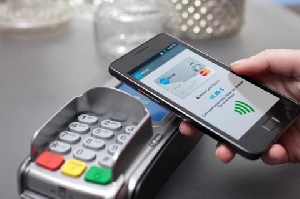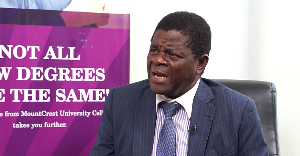The immediate reaction from people especially city dwellers in the wake of the partial lockdown announced by the President of Ghana on Friday 27th March 2020 is the spontaneous decision to hoard essential items that can help one to survive within the lockdown period.
People rushed to stock food, water, sanitary products and even money from financial institutions. I guess you can imagine the sudden disregard to social distancing protocols due to this rush.
Whilst it's reasonable to get enough for the period, it is just not necessary that some are rushing for their money from the financial institutions. This only creates a semblance of panic withdrawal, which is not in the interest of Ghana's financial system especially at this uncertain time. It is noteworthy that these financial institutions are well capitalized, being managed better and are ready to serve customers. At least this can be boldly inferred considering the recent 'cleansing' of the financial system by Bank of Ghana. Risks of hoarding Cash There are risks of hoarding cash at home. Hoarding cash at home predisposes you to theft.
Armed robbers are attracted to places where the potential for stealing money is high. Hoarding cash at home only increases the potential that armed robbers or ‘area boys’ will break into your home and make away with your money. Area boys is a term used to describe undisciplined youth in communities that engage in stealing items from homes or causing unnecessary disturbances.
Additionally, hoarding cash at home makes you engage in unnecessary buying. You have a life to live after COVID-19. You will survive this disease. This is not the time to engage in buying things that you really don’t need. It therefore makes sense to keep enough with your financial institution and just depend on the money you just need now. Moreover financial institutions have provided multi-channel access to your funds. You can utilize the channels to transact at any time. Banking and other financial institutions are currently educating their customers on the use of the alternate channels of service delivery and so you have to know and use those convenient channels instead of queuing at the banking halls. Contact your financial institution now to enquire about their digital offerings. Your Deposits Matter Financial institutions thrive on customers deposits. They need your savings to help stimulate economic growth through provision of loans to businesses. Financial institutions provide employment to people and therefore their existence need to be safeguarded not only by the government BUT by everybody. This is why I support the call by Bank of Ghana to all persons not to misunderstand the partial lockdown directive and engage in panic withdrawal.
Adopt Digital banking behavior
In any case moving to the banking halls to withdraw money is not a highly recommended practice because Ghana is making efforts to promote social distancing protocols. In place of this you are highly encouraged to patronize digital banking solutions offered by financial institutions. To enhance broader penetration financial intstitutions have mobile applications that enable you to perform your desired financial transactions. Others have USSD platforms that help both smart and non-smart phone users to perform same banking transactions.
Additionally some financial institutions have deployed internet banking that is available to customers.
You have a bouquet of options that meet your peculiar needs and you must decide to use these safe services especially at this time that we are making efforts to prevent COVID-19 from spreading within our communities.
The importance of digital financial solutions is enormous and very advantageous to all customers. Apart from saving you time, it is very convenient because the service is borderless i.e. one can transact anywhere in Ghana. Using digital banking services helps to promote cashless society, which is a key global land mark in our evolution that we cannot escape from.
Behavior change: Role of Financial Institutions
Financial institutions should make their digital services very simple and understandable.
If customers find it difficult to use their service, then they may be hesitant in utilizing digital channels being offered or promoted. In addition, the downtime of these services should be reduced to the barest minimum.
Since more people will be using their electronic gadgets, i.e. mobile phones and computers, to access these services it is recommended that the IT teams of the financial service providers and their outsourced counterparts should monitor their networks closely to ensure seamless service is delivered to Ghanaians that need the assurance that digital solutions are more convenient and faster.
Financial service providers should see investment in digital solutions as an investment that yields returns in the medium to long term and must deploy and sustain these services with a different mindset.
In our part of the world where literacy is relative low and adoption of new technology takes a longer curve, delivering digital solutions must be done in a sustained and dedicated manner supported by management and staff. They must constantly engage their customers on this.
Same must apply to investors in these financial institutions so that their expectations on short term dividends and returns will be appropriately positioned. Role of Bank of Ghana Bank of Ghana is a key player in regulating financial service providers in Ghana and for that matter it is necessary that they engage the public in understanding the role of digital financial services.
Instead of only communicating in English they have to adopt a strong strategy to reach
less literate in society. They have to engage the local radio stations so that the right information can be communicated directly to the populace.
As we endeavor to be resilient in the face of the spread of CVID-19 I encourage everyone to adopt safe digital banking lifestyles and continue to observe the recommended health protocols.
Written by Samson Addo, a young entrepreneur and an Energy Economics student with interest in Economic Development. Contact Samson on 2010risk@gmail.com or 0541834811.
Opinions of Wednesday, 1 April 2020
Columnist: Samson Addo



















